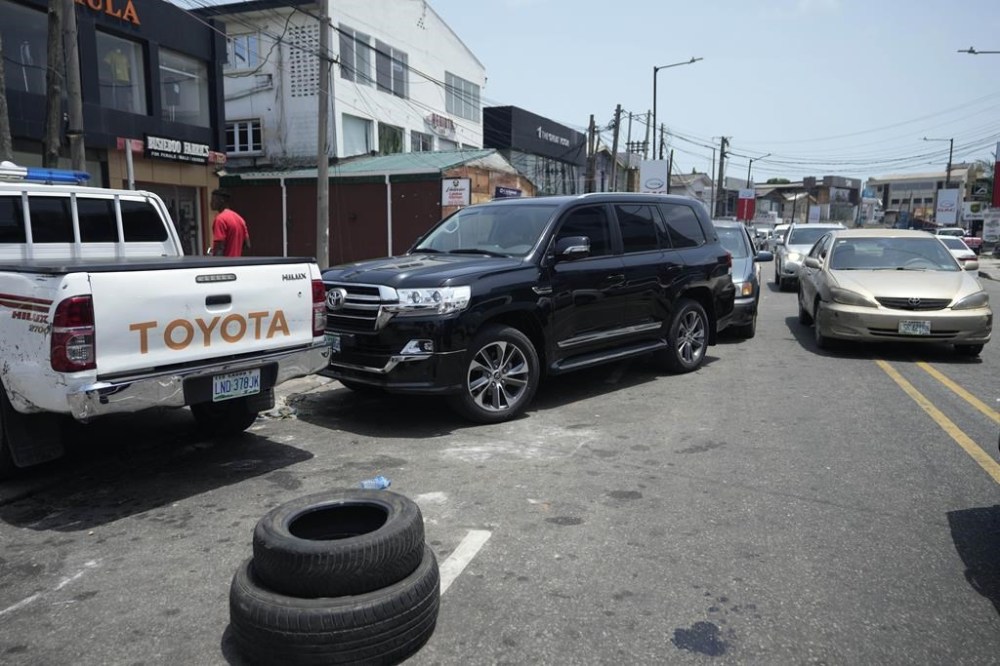Nigerians struggle with fuel shortages as queues form across major cities
Advertisement
Read this article for free:
or
Already have an account? Log in here »
To continue reading, please subscribe:
Monthly Digital Subscription
$0 for the first 4 weeks*
- Enjoy unlimited reading on winnipegfreepress.com
- Read the E-Edition, our digital replica newspaper
- Access News Break, our award-winning app
- Play interactive puzzles
*No charge for 4 weeks then price increases to the regular rate of $19.95 plus GST every four weeks. Offer available to new and qualified returning subscribers only. Cancel any time.
Monthly Digital Subscription
$4.99/week*
- Enjoy unlimited reading on winnipegfreepress.com
- Read the E-Edition, our digital replica newspaper
- Access News Break, our award-winning app
- Play interactive puzzles
*Billed as $19.95 plus GST every four weeks. Cancel any time.
To continue reading, please subscribe:
Add Free Press access to your Brandon Sun subscription for only an additional
$1 for the first 4 weeks*
*Your next subscription payment will increase by $1.00 and you will be charged $16.99 plus GST for four weeks. After four weeks, your payment will increase to $23.99 plus GST every four weeks.
Read unlimited articles for free today:
or
Already have an account? Log in here »
Hey there, time traveller!
This article was published 30/04/2024 (619 days ago), so information in it may no longer be current.
ABUJA, Nigeria (AP) — Nigerians were queuing for hours to buy fuel across major cities on Tuesday as the West African nation struggled with its latest fuel shortage, causing more hardship for millions already struggling in an economic crisis.
The fuel shortage has led to an increase in transportation costs in the country where many people rely on public transportation. Authorities blamed the shortage on supply disruptions due to logistical challenges. Queues leading to gas stations stretched up to 3 kilometers (1.8 miles) in some cities including the national capital, Abuja.
Nigeria is one of Africa’s top crude oil producers, but gasoline shortages are commonplace, mostly as a result of frequent strikes and supply disruptions. As on previous occasions, Nigeria’s state oil firm accused fuel companies of exploiting the current situation to maximize profit.

Nigeria relies heavily on imported fuel due to underperforming refineries. The biggest refinery in Africa opened recently in Lagos, Nigeria’s economic hub, and is expected to boost refining capacity. However, the privately owned facility still produces only diesel and aviation fuel.
The cost of fuel in many gas stations in Abuja has already jumped by more than 15% from the usual 675 naira (50 cents) per liter. Prices varied in other cities around the country.
The fuel crisis causes difficulties for the many businesses that run on generators because of Nigeria’s chronically erratic power supply, which has worsened in recent weeks.
In some parts of Abuja and Lagos, half the roads were filled with traffic jams of private car owners and taxi drivers, including some who had parked near gas stations overnight to buy fuel early.
“I haven’t done anything today since morning because how do you want to work when there is no fuel?” Abuja taxi driver Farouk Ibrahim asked. A father of two, Ibrahim said his greatest concern is finding money to return home with for the family’s next day’s meal.
“No fuel, no light, even to eat is a problem,” he said from a fuel queue in Abuja’s Garki district.

